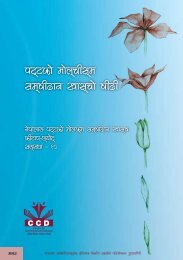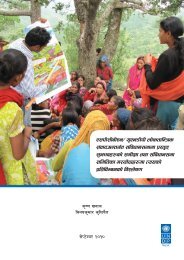- Page 1: The InterimConstitution ofNepal, 20
- Page 4 and 5: CONTENTSPART Iljifo ;"rLefu !About
- Page 6 and 7: ++g]kfnsf] cGtl/d ;+ljwfg, @)^#klxn
- Page 8 and 9: g]kfnsf] cGtl/d ;+ljwfg, @)^#klxnf]
- Page 10 and 11: {g]kfnsf] cGtl/d ;+ljwfg, @)^#klxnf
- Page 12 and 13: g]kfnsf] cGtl/d ;+ljwfg, @)^#klxnf]
- Page 14 and 15: g]kfnsf] cGtl/d ;+ljwfg, @)^#klxnf]
- Page 16 and 17: g]kfnsf] cGtl/d ;+ljwfg, @)^#klxnf]
- Page 18 and 19: g]kfnsf] cGtl/d ;+ljwfg, @)^#klxnf]
- Page 20 and 21: ]g]kfnsf] cGtl/d ;+ljwfg, @)^#klxnf
- Page 24 and 25: g]kfnsf] cGtl/d ;+ljwfg, @)^#klxnf]
- Page 26 and 27: ]{{g]kfnsf] cGtl/d ;+ljwfg, @)^#klx
- Page 28 and 29: {g]kfnsf] cGtl/d ;+ljwfg, @)^#klxnf
- Page 30 and 31: }g]kfnsf] cGtl/d ;+ljwfg, @)^#klxnf
- Page 32 and 33: g]kfnsf] cGtl/d ;+ljwfg, @)^#klxnf]
- Page 34 and 35: +g]kfnsf] cGtl/d ;+ljwfg, @)^#klxnf
- Page 36 and 37: g]kfnsf] cGtl/d ;+ljwfg, @)^#klxnf]
- Page 38 and 39: g]kfnsf] cGtl/d ;+ljwfg, @)^#klxnf]
- Page 40 and 41: g]kfnsf] cGtl/d;+ljwfg, @)^#klxnf]b
- Page 42 and 43: g]kfnsf] cGtl/d ;+ljwfg, @)^#klxnf]
- Page 44 and 45: g]kfnsf] cGtl/d ;+ljwfg, @)^#klxnf]
- Page 46 and 47: g]kfnsf] cGtl/d ;+ljwfg, @)^#klxnf]
- Page 48 and 49: g]kfnsf] cGtl/d ;+ljwfg, @)^#klxnf]
- Page 50 and 51: g]kfnsf] cGtl/d ;+ljwfg, @)^#klxnf]
- Page 52 and 53: g]kfnsf] cGtl/d ;+ljwfg, @)^#klxnf]
- Page 54 and 55: g]kfnsf] cGtl/d ;+ljwfg, @)^#klxnf]
- Page 56 and 57: {g]kfnsf] cGtl/d ;+ljwfg, @)^#klxnf
- Page 58 and 59: g]kfnsf] cGtl/d ;+ljwfg, @)^#klxnf]
- Page 60 and 61: g]kfnsf] cGtl/d ;+ljwfg, @)^#klxnf]
- Page 62 and 63: g]kfnsf] cGtl/d ;+ljwfg, @)^#klxnf]
- Page 64 and 65: g]kfnsf] cGtl/d ;+ljwfg, @)^#klxnf]
- Page 66 and 67: g]kfnsf] cGtl/d ;+ljwfg, @)^#klxnf]
- Page 68 and 69: g]kfnsf] cGtl/d ;+ljwfg, @)^#klxnf]
- Page 70 and 71: g]kfnsf] cGtl/d ;+ljwfg, @)^#klxnf]
- Page 72 and 73:
{g]kfnsf] cGtl/d ;+ljwfg, @)^#klxnf
- Page 74 and 75:
g]kfnsf] cGtl/d ;+ljwfg, @)^#klxnf]
- Page 76 and 77:
g]kfnsf] cGtl/d ;+ljwfg, @)^#klxnf]
- Page 78 and 79:
{g]kfnsf] cGtl/d ;+ljwfg, @)^#klxnf
- Page 80 and 81:
g]kfnsf] cGtl/d ;+ljwfg, @)^#klxnf]
- Page 82 and 83:
g]kfnsf] cGtl/d ;+ljwfg, @)^#klxnf]
- Page 84 and 85:
{g]kfnsf] cGtl/d ;+ljwfg, @)^#klxnf
- Page 86 and 87:
{g]kfnsf] cGtl/d ;+ljwfg, @)^#klxnf
- Page 88 and 89:
g]kfnsf] cGtl/d ;+ljwfg, @)^#klxnf]
- Page 90 and 91:
g]kfnsf] cGtl/d ;+ljwfg, @)^#klxnf]
- Page 92 and 93:
g]kfnsf] cGtl/d ;+ljwfg, @)^#klxnf]
- Page 94 and 95:
g]kfnsf] cGtl/d ;+ljwfg, @)^#klxnf]
- Page 96 and 97:
g]kfnsf] cGtl/d ;+ljwfg, @)^#klxnf]
- Page 98 and 99:
g]kfnsf] cGtl/d ;+ljwfg, @)^#klxnf]
- Page 100 and 101:
g]kfnsf] cGtl/d ;+ljwfg, @)^#klxnf]
- Page 102 and 103:
g]kfnsf] cGtl/d ;+ljwfg, @)^#klxnf]
- Page 104 and 105:
g]kfnsf] cGtl/d ;+ljwfg, @)^#klxnf]
- Page 106 and 107:
g]kfnsf] cGtl/d ;+ljwfg, @)^#klxnf]
- Page 108 and 109:
g]kfnsf] cGtl/d ;+ljwfg, @)^#klxnf]
- Page 110 and 111:
g]kfnsf] cGtl/d ;+ljwfg, @)^#klxnf]
- Page 112 and 113:
g]kfnsf] cGtl/d ;+ljwfg, @)^#klxnf]
- Page 114 and 115:
g]kfnsf] cGtl/d ;+ljwfg, @)^#klxnf]
- Page 116 and 117:
g]kfnsf] cGtl/d ;+ljwfg, @)^#klxnf]
- Page 118 and 119:
g]kfnsf] cGtl/d ;+ljwfg, @)^#klxnf]
- Page 120 and 121:
g]kfnsf] cGtl/d ;+ljwfg, @)^#klxnf]
- Page 122 and 123:
g]kfnsf] cGtl/d ;+ljwfg, @)^#klxnf]
- Page 124 and 125:
g]kfnsf] cGtl/d ;+ljwfg, @)^#klxnf]
- Page 126 and 127:
g]kfnsf] cGtl/d ;+ljwfg, @)^#klxnf]
- Page 128 and 129:
g]kfnsf] cGtl/d ;+ljwfg, @)^#klxnf]
- Page 130 and 131:
g]kfnsf] cGtl/d ;+ljwfg, @)^#klxnf]
- Page 132 and 133:
g]kfnsf] cGtl/d ;+ljwfg, @)^#klxnf]
- Page 134 and 135:
]g]kfnsf] cGtl/d ;+ljwfg, @)^#klxnf
- Page 136 and 137:
g]kfnsf] cGtl/d ;+ljwfg, @)^#klxnf]
- Page 138 and 139:
g]kfnsf] cGtl/d ;+ljwfg, @)^#klxnf]
- Page 140 and 141:
g]kfnsf] cGtl/d ;+ljwfg, @)^#klxnf]
- Page 142 and 143:
g]kfnsf] cGtl/d ;+ljwfg, @)^#klxnf]
- Page 144 and 145:
g]kfnsf] cGtl/d ;+ljwfg, @)^#klxnf]
- Page 146 and 147:
{g]kfnsf] cGtl/d ;+ljwfg, @)^#klxnf
- Page 148 and 149:
g]kfnsf] cGtl/d ;+ljwfg, @)^#klxnf]
- Page 150 and 151:
g]kfnsf] cGtl/d ;+ljwfg, @)^#klxnf]
- Page 152 and 153:
g]kfnsf] cGtl/d ;+ljwfg, @)^#klxnf]
- Page 154 and 155:
g]kfnsf] cGtl/d ;+ljwfg, @)^#klxnf]
- Page 156 and 157:
g]kfnsf] cGtl/d ;+ljwfg, @)^#klxnf]
- Page 158 and 159:
g]kfnsf] cGtl/d ;+ljwfg, @)^#klxnf]
- Page 160 and 161:
g]kfnsf] cGtl/d ;+ljwfg, @)^#klxnf]
- Page 162 and 163:
{g]kfnsf] cGtl/d ;+ljwfg, @)^#klxnf
- Page 164 and 165:
g]kfnsf] cGtl/d ;+ljwfg, @)^#klxnf]
- Page 166 and 167:
g]kfnsf] cGtl/d ;+ljwfg, @)^#klxnf]
- Page 168 and 169:
g]kfnsf] cGtl/d ;+ljwfg, @)^#klxnf]
- Page 170 and 171:
{g]kfnsf] cGtl/d ;+ljwfg, @)^#klxnf
- Page 172 and 173:
g]kfnsf] cGtl/d ;+ljwfg, @)^#klxnf]
- Page 174 and 175:
g]kfnsf] cGtl/d ;+ljwfg, @)^#klxnf]
- Page 176 and 177:
g]kfnsf] cGtl/d ;+ljwfg, @)^#klxnf]
- Page 178 and 179:
g]kfnsf] cGtl/d ;+ljwfg, @)^#klxnf]
- Page 180 and 181:
g]kfnsf] cGtl/d ;+ljwfg, @)^#klxnf]
- Page 182 and 183:
g]kfnsf] cGtl/d ;+ljwfg, @)^#klxnf]
- Page 184 and 185:
g]kfnsf] cGtl/d ;+ljwfg, @)^#klxnf]
- Page 186 and 187:
g]kfnsf] cGtl/d ;+ljwfg, @)^#klxnf]
- Page 188 and 189:
g]kfnsf] cGtl/d ;+ljwfg, @)^#klxnf]
- Page 190 and 191:
g]kfnsf] cGtl/d ;+ljwfg, @)^#klxnf]
- Page 192 and 193:
g]kfnsf] cGtl/d ;+ljwfg, @)^#klxnf]
- Page 194 and 195:
{g]kfnsf] cGtl/d ;+ljwfg, @)^#klxnf
- Page 196 and 197:
g]kfnsf] cGtl/d ;+ljwfg, @)^#klxnf]
- Page 198 and 199:
{g]kfnsf] cGtl/d ;+ljwfg, @)^#klxnf
- Page 200 and 201:
g]kfnsf] cGtl/d ;+ljwfg, @)^#klxnf]
- Page 202 and 203:
g]kfnsf] cGtl/d ;+ljwfg, @)^#klxnf]
- Page 204 and 205:
g]kfnsf] cGtl/d ;+ljwfg, @)^#klxnf]
- Page 206 and 207:
g]kfnsf] cGtl/d ;+ljwfg, @)^#klxnf]
- Page 208 and 209:
g]kfnsf] cGtl/d ;+ljwfg, @)^#klxnf]
- Page 210 and 211:
'g]kfnsf] cGtl/d ;+ljwfg, @)^#klxnf
- Page 212 and 213:
{g]kfnsf] cGtl/d ;+ljwfg, @)^#klxnf
- Page 214 and 215:
g]kfnsf] cGtl/d ;+ljwfg, @)^#klxnf]
- Page 216 and 217:
g]kfnsf] cGtl/d ;+ljwfg, @)^#klxnf]
- Page 218 and 219:
g]kfnsf] cGtl/d ;+ljwfg, @)^#klxnf]
- Page 220 and 221:
g]kfnsf] cGtl/d ;+ljwfg, @)^#klxnf]
- Page 222 and 223:
g]kfnsf] cGtl/d ;+ljwfg, @)^#klxnf]
- Page 224 and 225:
]g]kfnsf] cGtl/d ;+ljwfg, @)^#klxnf
- Page 226 and 227:
g]kfnsf] cGtl/d ;+ljwfg, @)^#klxnf]
- Page 228 and 229:
g]kfnsf] cGtl/d ;+ljwfg, @)^#klxnf]
- Page 230 and 231:
g]kfnsf] cGtl/d ;+ljwfg, @)^#klxnf]
- Page 232 and 233:
g]kfnsf] cGtl/d ;+ljwfg, @)^#klxnf]
- Page 234 and 235:
g]kfnsf] cGtl/d ;+ljwfg, @)^#klxnf]
- Page 236 and 237:
g]kfnsf] cGtl/d ;+ljwfg, @)^#klxnf]
- Page 238 and 239:
g]kfnsf] cGtl/d ;+ljwfg, @)^#klxnf]
- Page 240 and 241:
g]kfnsf] cGtl/d ;+ljwfg, @)^#klxnf]
- Page 242 and 243:
g]kfnsf] cGtl/d ;+ljwfg, @)^#klxnf]
- Page 244 and 245:
g]kfnsf] cGtl/d ;+ljwfg, @)^#klxnf]
- Page 246 and 247:
g]kfnsf] cGtl/d ;+ljwfg, @)^#klxnf]
- Page 248 and 249:
g]kfnsf] cGtl/d ;+ljwfg, @)^#klxnf]
- Page 250 and 251:
g]kfnsf] cGtl/d ;+ljwfg, @)^#klxnf]
- Page 252 and 253:
g]kfnsf] cGtl/d ;+ljwfg, @)^#klxnf]
- Page 254 and 255:
g]kfnsf] cGtl/d ;+ljwfg, @)^#klxnf]
- Page 256 and 257:
g]kfnsf] cGtl/d ;+ljwfg, @)^#klxnf]
- Page 258 and 259:
g]kfnsf] cGtl/d ;+ljwfg, @)^#klxnf]
- Page 260 and 261:
g]kfnsf] cGtl/d ;+ljwfg, @)^#klxnf]
- Page 262 and 263:
g]kfnsf] cGtl/d ;+ljwfg, @)^#klxnf]
- Page 264 and 265:
g]kfnsf] cGtl/d ;+ljwfg, @)^#klxnf]
- Page 266 and 267:
g]kfnsf] cGtl/d ;+ljwfg, @)^#klxnf]
- Page 268 and 269:
g]kfnsf] cGtl/d ;+ljwfg, @)^#klxnf]
- Page 270 and 271:
g]kfnsf] cGtl/d ;+ljwfg, @)^#klxnf]
- Page 272 and 273:
g]kfnsf] cGtl/d ;+ljwfg, @)^#klxnf]
- Page 274 and 275:
g]kfnsf] cGtl/d ;+ljwfg, @)^#klxnf]
- Page 276 and 277:
g]kfnsf] cGtl/d ;+ljwfg, @)^#klxnf]
- Page 278 and 279:
]g]kfnsf] cGtl/d ;+ljwfg, @)^#klxnf
- Page 280 and 281:
g]kfnsf] cGtl/d ;+ljwfg, @)^#klxnf]
- Page 282 and 283:
g]kfnsf] cGtl/d ;+ljwfg, @)^#klxnf]
- Page 284 and 285:
g]kfnsf] cGtl/d ;+ljwfg, @)^#klxnf]
- Page 286 and 287:
{g]kfnsf] cGtl/d ;+ljwfg, @)^#klxnf
- Page 288 and 289:
g]kfnsf] cGtl/d ;+ljwfg, @)^#klxnf]
- Page 290 and 291:
g]kfnsf] cGtl/d ;+ljwfg, @)^#klxnf]
- Page 292 and 293:
g]kfnsf] cGtl/d ;+ljwfg, @)^#klxnf]
- Page 294 and 295:
g]kfnsf] cGtl/d ;+ljwfg, @)^#klxnf]
- Page 296 and 297:
g]kfnsf] cGtl/d ;+ljwfg, @)^#klxnf]
- Page 298 and 299:
g]kfnsf] cGtl/d ;+ljwfg, @)^#klxnf]
- Page 300 and 301:
g]kfnsf] cGtl/d ;+ljwfg, @)^#klxnf]
- Page 302 and 303:
{g]kfnsf] cGtl/d ;+ljwfg, @)^#klxnf
- Page 304 and 305:
g]kfnsf] cGtl/d ;+ljwfg, @)^#klxnf]
- Page 306 and 307:
{g]kfnsf] cGtl/d ;+ljwfg, @)^#klxnf
- Page 308 and 309:
g]kfnsf] cGtl/d ;+ljwfg, @)^#klxnf]
- Page 310 and 311:
g]kfnsf] cGtl/d ;+ljwfg, @)^#klxnf]
- Page 312 and 313:
g]kfnsf] cGtl/d ;+ljwfg, @)^#klxnf]
- Page 314 and 315:
g]kfnsf] cGtl/d ;+ljwfg, @)^#klxnf]
- Page 316 and 317:
g]kfnsf] cGtl/d ;+ljwfg, @)^#klxnf]
- Page 318 and 319:
g]kfnsf] cGtl/d ;+ljwfg, @)^#klxnf]
- Page 320 and 321:
g]kfnsf] cGtl/d ;+ljwfg, @)^#klxnf]
- Page 322 and 323:
g]kfnsf] cGtl/d ;+ljwfg, @)^#klxnf]
- Page 324 and 325:
g]kfnsf] cGtl/d ;+ljwfg, @)^#klxnf]
- Page 326 and 327:
{g]kfnsf] cGtl/d ;+ljwfg, @)^#klxnf
- Page 328 and 329:
g]kfnsf] cGtl/d ;+ljwfg, @)^#klxnf]
- Page 330 and 331:
{g]kfnsf] cGtl/d ;+ljwfg, @)^#klxnf
- Page 332 and 333:
g]kfnsf] cGtl/d ;+ljwfg, @)^#klxnf]
- Page 334 and 335:
g]kfnsf] cGtl/d ;+ljwfg, @)^#klxnf]
- Page 336 and 337:
{g]kfnsf] cGtl/d ;+ljwfg, @)^#klxnf
- Page 338 and 339:
g]kfnsf] cGtl/d ;+ljwfg, @)^#klxnf]




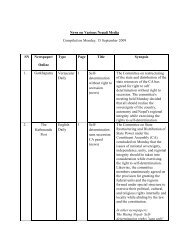

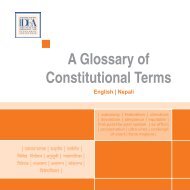
![g]k fnsf blntx? / gofF ;+l jwfg](https://img.yumpu.com/49483602/1/184x260/gk-fnsf-blntx-goff-l-jwfg.jpg?quality=85)
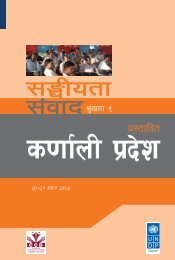
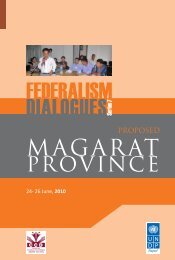
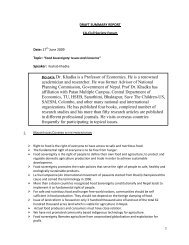
![+ljwfg;ef, /fHosf]k'g](https://img.yumpu.com/41604075/1/184x260/-ljwfgef-fhosfkg.jpg?quality=85)
